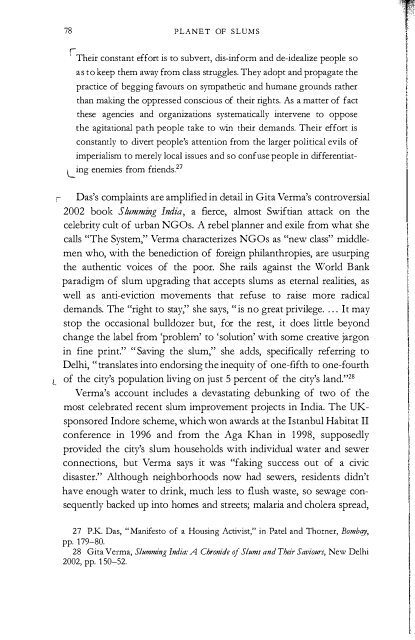Untitled - Rebel Studies Library
Untitled - Rebel Studies Library
Untitled - Rebel Studies Library
Create successful ePaper yourself
Turn your PDF publications into a flip-book with our unique Google optimized e-Paper software.
78 PLANET OF SLUMS<br />
r<br />
\ Their constant effort is to subvert, dis-inform and de-idealize people so<br />
as to keep them away from class struggles. They adopt and propagate the<br />
practice of begging favours on sympathetic and humane grounds rather<br />
than making the oppressed conscious of their rights. As a matter of fact<br />
these agencies and organizations systematically intervene to oppose<br />
the agitational path people take to win their demands. Their effort is<br />
constantly to divert people's attention from the larger political evils of<br />
imperialism to merely local issues and so confuse people in differentiat-<br />
L<br />
ing enemies from friends.27<br />
r Das's complaints are amplified in detail in Gita Verma's controversial<br />
2002 book Slumming India, a fierce, almost Swiftian attack on the<br />
celebrity cult of urban NGOs. A rebel planner and exile from what she<br />
calls "The System," Verma characterizes NGOs as "new class" middlemen<br />
who, with the benediction of foreign philanthropies, are usurping<br />
the authentic voices of the poor. She rails against the World Bank<br />
paradigm of slum upgrading that accepts slums as eternal realities, as<br />
well as anti-eviction movements that refuse to raise more radical<br />
demands. The "right to stay," she says, "is no great privilege . ... It may<br />
stop the occasional bulldozer but, for the rest, it does little beyond<br />
change the label from 'problem' to 'solution' with some creative jargon<br />
in fine print." "Saving the slum," she adds, specifically referring to<br />
Delhi, "translates into endorsing the inequity of one-fifth to one-fourth<br />
l of the city's population living on just 5 percent of the city's land."28<br />
Verma's account includes a devastating debunking of two of the<br />
most celebrated recent slum improvement projects in India. The UKsponsored<br />
Indore scheme, which won awards at the Istanbul Habitat II<br />
conference in 1996 and from the Aga Khan in 1998, supposedly<br />
provided the city's slum households with individual water and sewer<br />
connections, but Verma says it was "faking success out of a civic<br />
disaster." Although neighborhoods now had sewers, residents didn't<br />
have enough water to drink, much less to flush waste, so sewage consequently<br />
backed up into homes and streets; malaria and cholera spread,<br />
27 P.K. Das, "Manifesto of a Housing Activist," in Patel and Thorner, Bombay,<br />
pp. 179-80.<br />
28 Gita Verma, Slumming India: A Chronicle of Slums and Their Saviours, New Delhi<br />
2002, pp. 150-52.<br />
ILLUSIONS OF SELF-HELP 79<br />
and residents began to die from contaminated water. Each summer,<br />
Verma writes, "brought project beneficiaries (or, perhaps, Project<br />
Mfected Persons) more water shortages, more choked drains, more<br />
diseases, more monsoon mess, and more cause to complain about the<br />
shoddy project infrastructure and poor quality ... "29<br />
Verma is equally scalding about the award-winning Aranya resettlement<br />
project: one of a species of projects that rehouse only a small<br />
number of evictees or squatters but confer international celebrity on<br />
their "slum saviors." In this case, however, most of the project's<br />
achievements were literally on paper.<br />
The truth about Aranya, however, is that its winning elements simply do<br />
not exist on the ground. There is no town centre, no flowing pedestrian<br />
greens, and no 40,000 poor people living there. These exist only in the<br />
literature on Aranya and for more than a decade we have been celebrat<br />
ing a drawing, a design idea, that we are not sure will work because it has<br />
not yet been tested.3o<br />
Even observers less harsh than Verma agree that while the World<br />
Bank/NGO approach to slum upgrading may produce local success<br />
stories, it leaves the vast majority of the poor behind. NGOs, observes<br />
activist and writer Arundhati Roy, "end up functioning like the whistle on<br />
a pressure cooker. They divert and sublimate political rage, and make<br />
sure it does not build to a head."31 Syrupy official assurances about --\<br />
"enablement" and "good governance" sidestep core issues of global<br />
inequality and debt, and ultimately they are just language games that<br />
cloak the absence of any macro-strategy for alleviating urban povertY' " J<br />
Perhaps this guilty awareness of the gap between promise and need<br />
explains some of the fervor with which international lending institutions<br />
and NGOs have embraced the ideas of Hernando de Soto, the Peruvian<br />
businessman who has become the global guru of neo-liberal populism.<br />
A John Turner for the 1990s, de Soto asserts that Third World cities<br />
are not so much starved of investment and jobs as suffering an artificial<br />
29 Ibid., pp. 8-15, 33-35.<br />
30 Ibid., pp. 90-9 1.<br />
31 Arundhati Roy, The Checkbook and the Cruise Missile: Conversations with Arundhati<br />
RgI, Boston 2004, p. 82.


